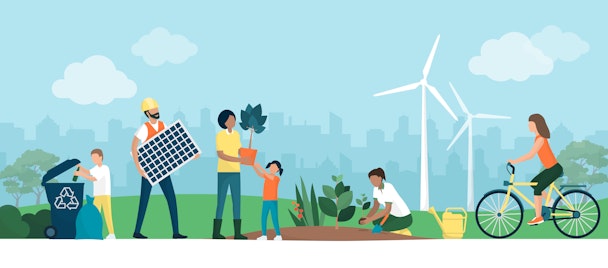The Princess Bride guide to sustainability: where can agencies go from here?
The word ‘sustainability’ is bandied about a lot these days, even though there’s not much of a general consensus on what it really means. This is problematic, because we can only work toward meaningful change once we’re working toward a common goal – and before that can happen, we need to be speaking the same language.

There must be universal agreement on what ‘sustainability’ means
“You keep using that word. I do not think it means what you think it means.” – Inigo Montoya
In the wake of a disturbing Intergovernmental Panel on Climate Change (IPCC) report on climate change acceleration, a year of unprecedented flooding, fires and freezing around the world, an international and domestic political apparatus gridlocked on a plan of action, and a growing citizen awareness, maybe climate change isn't going to just 'work out' on its own.
But what does ‘sustainability’ actually mean? The very word has evolved into a kind of linguistic Rorschach test that’s often more a reflection of individual perception than any collective, baseline agreement between businesses, governments or consumers. This lack of consensus regarding nomenclature and scope is problematic in multiple ways, but two stand out. One, it makes it difficult for agencies and brands trying to be legitimately good actors to really chart a path forward. Two, it leaves the door open for a lot of greenwashing.
Oil fracking could be called sustainable under the traditional definition of the word. Case in point: oil fracking is sustainable if your definition is a managed drawdown of a 20-year resource charted over a 20-year business timeline. That’s sustainable, isn’t it? The resource has been matched to the desired timeline.
Or take a more innocuous example, one predicated on good intentions but fraught with pitfalls. What should agencies and their clients include in sustainability efforts – environmental concerns, corporate governance, equity, diversity and the latest addition of privacy? And what should these efforts be called? Purpose? ESG? Corporate social responsibility? Or is there now a collective agreement to call it sustainability?
These might seem like trivial, navel-gazing questions tantamount to wondering if you watered your ficus while running out the door of your burning house (i.e. just focus on putting out the fire). But what things are called and how they are defined will increasingly matter to businesses, governments and consumers. Without broad agreement on what something is called, how it’s defined and, perhaps most importantly, how it’s measured, real progress is going to prove elusive.
There’s good news and bad news on this front. The good news is that there is already a lot of good work under way in this area. Domestically, federal regulatory agencies such as the Federal Trade Commission (via an upcoming Green Guides update) and the Securities and Exchange Commission are talking about providing new rules and guidance on topics such as greenwashing and ‘green’ investment. Internationally, EU and UK regulators have promulgated a lot of new rules in this area as well (or at least have begun to). There are also several private party actors (eco-label groups, as well as various other NGOs) looking to create some commonality of nomenclature and standardization of metrics. These are all important efforts.
The bad news is that none of this is easy. While much of the focus around sustainability constructs thus far seems to have centered on greenhouse gas emissions because of urgency, there is still a lot of ground to cover beyond emissions. The need for a mutual agreement on defining and measuring emissions remains.
Later this month, the 4A’s will begin convening its inaugural Sustainability Task Force to work on important issues including developing some commonality of nomenclature in this space. There is a lot of great work to build on, and an opportunity to go further to advance sustainability practices that have agreed-upon meaning and result in real progress.
For agencies, there will be many opportunities in the next decade to become experts on these issues, and to help guide clients through an increasingly complex, quickly pivoting landscape. As always there is great value in being knowledgeable enough to ask the right questions and weigh the right risk factors – because it’s unlikely that the answers will be obvious.
Alison Pepper is executive vice-president of government relations at the 4A’s.
